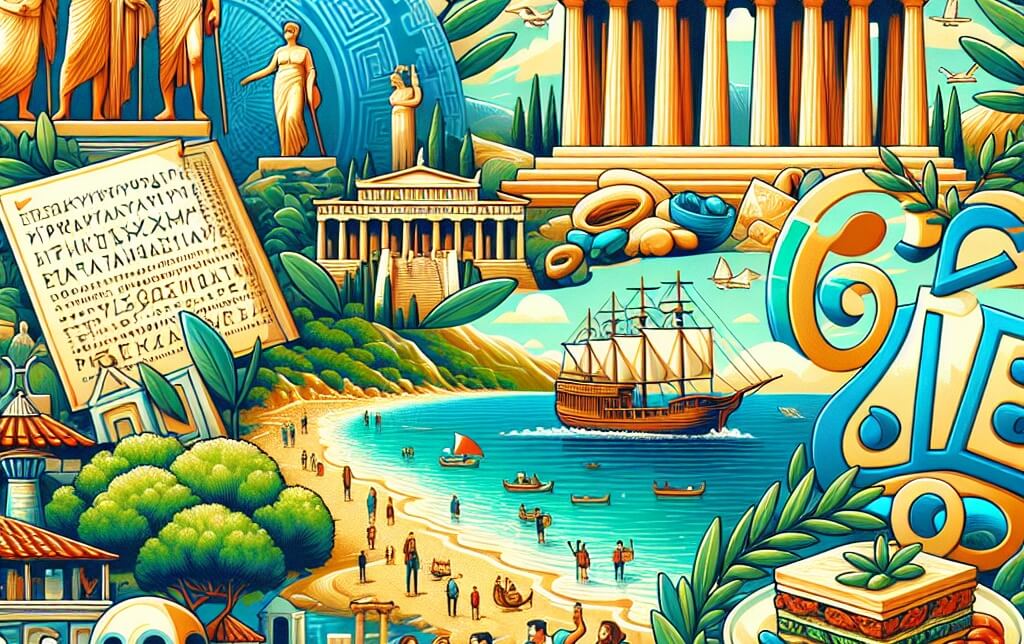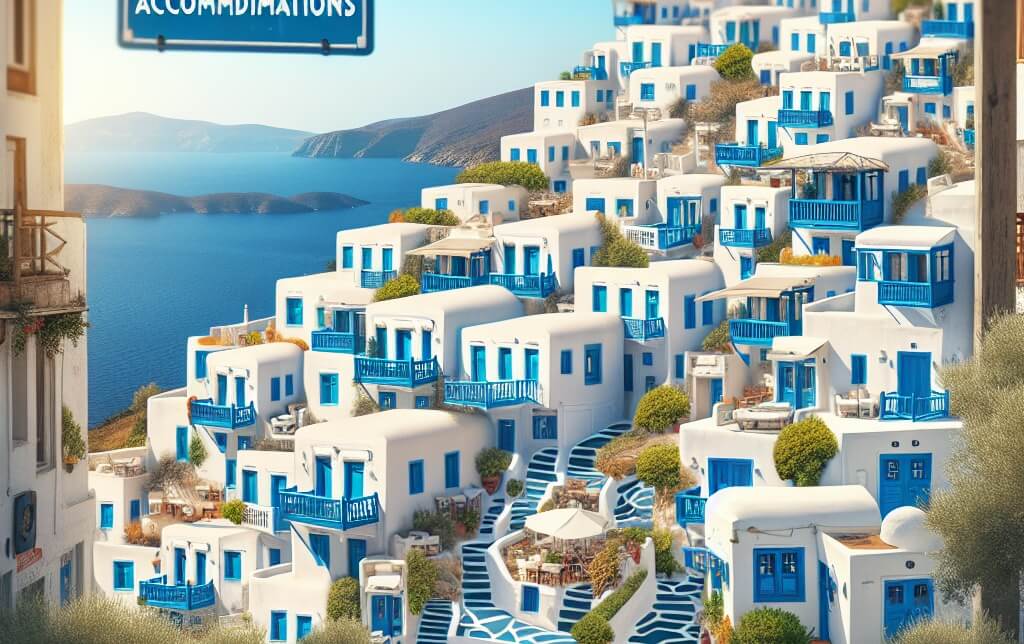
Discover the Splendor of Arcadia, Greece - Travel Guide
Embark on a journey to explore the timeless beauty and captivating allure of Arcadia, Greece with our comprehensive travel guide. Nestled amidst the verdant landscapes of the Peloponnese region, Arcadia beckons travelers with its rich history, picturesque villages, and majestic mountains. Immerse yourself in the splendor of ancient ruins, such as the renowned Temple of Apollo Epicurius and the mythical birthplace of Zeus, while wandering through olive groves and vineyards that have stood the test of time. Indulge in the local cuisine, savoring traditional dishes bursting with flavors unique to the region. Whether you seek adventure in the great outdoors or a tranquil retreat in a quaint village, Arcadia promises an unforgettable experience that resonates with the essence of Greece's cultural heritage. Unveil the secrets of this enchanting destination and let its charm leave an indelible mark on your travel memories.
Introduction
The introduction of Arcadia, Greece sets the stage for a journey through a region steeped in history, mythology, and natural beauty. Located in the heart of the Peloponnese peninsula, Arcadia is renowned for its picturesque landscapes, including rolling hills, lush forests, and crystal-clear rivers. In ancient times, Arcadia was considered a pastoral paradise, home to mythological creatures and revered by poets and philosophers alike. Today, visitors can explore the region's rich cultural heritage, from ancient ruins to traditional villages, and immerse themselves in the timeless beauty that has captivated travelers for centuries.
Geography and Location
The geography and location of Arcadia, Greece play a significant role in shaping the region's character and history. Situated in the central part of the Peloponnese peninsula, Arcadia is known for its rugged and mountainous terrain, with the famous Mount Mainalo dominating the landscape. This topography not only provided natural defense for the ancient inhabitants but also influenced their way of life, fostering a strong sense of independence and self-sufficiency. The region's fertile valleys and abundant water sources supported agriculture and pastoralism, allowing the Arcadians to thrive and develop a unique culture. Furthermore, Arcadia's central position in the Peloponnese facilitated trade and communication with other city-states, contributing to its strategic importance in ancient Greece.
Historical Significance
Arcadia, a region in ancient Greece, holds significant historical importance due to its reputation as a pastoral paradise and its association with the idealized concept of rural simplicity and natural beauty. Arcadia was celebrated in Greek literature and art as a place of peace, harmony, and untouched wilderness. This idealization of Arcadia had a lasting impact on Western culture, influencing artistic representations, philosophical discussions, and literary works for centuries. Additionally, Arcadia played a role in the development of Greek mythology, with tales of gods and nymphs inhabiting its forests and mountains. The enduring legacy of Arcadia as a symbol of an idyllic, pure existence continues to captivate scholars and artists, making it a crucial element in the study of ancient Greek culture and its influence on subsequent societies.
Mythology and Religion
In the context of Arcadia, Greece, the intertwined relationship between mythology and religion played a significant role in shaping the cultural and spiritual beliefs of the ancient Arcadian people. Mythology served as a powerful tool for explaining the natural world and human existence, with gods and goddesses embodying various aspects of life and nature. The religious practices of the Arcadian people were deeply rooted in these myths, with rituals and ceremonies dedicated to honoring and appeasing the deities. The mythological stories of Arcadia, such as the tales of Pan and the nymphs, were not just entertainment but held deep symbolic meaning that guided the religious practices and beliefs of the Arcadian society. As such, mythology and religion in Arcadia were intrinsically linked, providing a framework for understanding the world and one's place within it.
Archaeological Sites
Archaeological sites in Arcadia, Greece hold significant historical and cultural importance, offering valuable insights into the ancient civilization that once thrived in the region. These sites serve as tangible links to the past, allowing scholars and visitors to learn about the daily life, architecture, and beliefs of the people who inhabited this area centuries ago. The meticulous excavation and preservation efforts at these sites have contributed to the broader understanding of Arcadian history and have shed light on various aspects of ancient Greek society. Furthermore, the presence of these archaeological sites in Arcadia underscores the enduring legacy of the region and its rich heritage, making them essential destinations for those interested in exploring the depths of Greece's past.
Modern Arcadia
Modern Arcadia, located in the region of Arcadia, Greece, represents a harmonious blend of natural beauty and contemporary living. This picturesque region, known for its lush landscapes and serene surroundings, has evolved into a modern-day haven that embraces both tradition and innovation. With its charming villages, bustling towns, and stunning mountainous scenery, Modern Arcadia offers residents and visitors a unique experience that celebrates the rich history and cultural heritage of the area while also catering to the needs and demands of the present day. From eco-friendly initiatives to cultural festivals, Modern Arcadia embodies a perfect balance between preserving its past and embracing the future, making it a truly enchanting destination for all who seek a tranquil escape from the hustle and bustle of urban life.
Tourist Attractions
Arcadia, Greece is renowned for its rich history and picturesque landscapes, making it a popular destination for tourists seeking a glimpse into the country's ancient past and natural beauty. The region boasts a number of notable tourist attractions, such as the ancient archaeological site of Olympia, where the first Olympic Games were held in 776 BC. Visitors can also explore the historic town of Mystras, a UNESCO World Heritage site known for its well-preserved Byzantine architecture and stunning views of the surrounding mountains. Additionally, the lush forests and scenic hiking trails of the Lousios Gorge offer outdoor enthusiasts the opportunity to immerse themselves in the region's stunning natural scenery. Overall, Arcadia, Greece offers a diverse array of attractions that cater to a wide range of interests, making it a must-visit destination for travelers seeking a blend of history, culture, and natural beauty.
Arcadia's Natural Resources
Arcadia, located in Greece, is endowed with a rich array of natural resources that have played a significant role in the region's historical and cultural development. The lush forests of Arcadia provide a diverse range of timber and wood products, while its fertile plains support agricultural activities such as the cultivation of olives, grapes, and citrus fruits. Additionally, Arcadia's mountains are a source of mineral resources such as marble, which has been highly valued for its quality and beauty since ancient times. These natural resources have not only sustained the local economy but have also shaped the landscape and character of Arcadia, making it a region of both natural beauty and economic significance.
Arcadia's Contribution to Greek History
Arcadia, a region located in the heart of the Peloponnese peninsula in Greece, has made significant contributions to Greek history. Known for its rugged mountains, lush forests, and pastoral beauty, Arcadia played a crucial role in shaping the cultural and social landscape of ancient Greece. In myth and legend, Arcadia was often portrayed as an idyllic, pastoral paradise, inhabited by shepherds and nymphs. This romanticized image of Arcadia influenced the development of Greek literature, art, and philosophy, with many writers and artists drawing inspiration from its serene and untouched natural beauty. Additionally, Arcadia was home to several important ancient Greek cities, such as Megalopolis and Tegea, which played key roles in shaping the political and military history of the region. Overall, Arcadia's contributions to Greek history are multifaceted, encompassing both its mythological significance and its tangible impact on the political and cultural development of ancient Greece.
Conclusion
In conclusion, Arcadia, Greece, holds a significant place in the country's history and mythology. Known for its picturesque landscapes, lush forests, and ancient ruins, Arcadia embodies the essence of natural beauty and cultural heritage. The region has long been a source of inspiration for artists, writers, and philosophers, who have been captivated by its tranquil charm and mystical aura. Despite the passage of time, Arcadia continues to evoke a sense of nostalgia and wonder, drawing visitors from around the world to experience its timeless allure. As a symbol of Greece's rich past and enduring spirit, Arcadia stands as a testament to the enduring legacy of this storied land.









